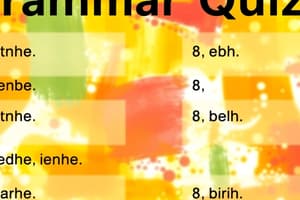Podcast
Questions and Answers
Which tense is commonly used to describe habits and general statements?
Which tense is commonly used to describe habits and general statements?
- Present continuous tense (correct)
- Simple future tense
- Past perfect continuous tense
- Past continuous tense
When do we use the present perfect continuous tense?
When do we use the present perfect continuous tense?
- For past completed actions
- To describe habits
- To talk about recent or ongoing actions (correct)
- For general statements
Which tense is suitable for actions that started in the past and have consequences in the present?
Which tense is suitable for actions that started in the past and have consequences in the present?
- Present perfect continuous tense (correct)
- Past continuous tense
- Past simple tense
- Simple future tense
In which situation is the present continuous tense NOT typically used?
In which situation is the present continuous tense NOT typically used?
Which type of action does the simple present tense mainly focus on?
Which type of action does the simple present tense mainly focus on?
When is the past continuous tense commonly used?
When is the past continuous tense commonly used?
Which part of speech is used to describe actions or experiences in a sentence?
Which part of speech is used to describe actions or experiences in a sentence?
What part of speech replaces the name of a person, place, thing, or idea in a sentence?
What part of speech replaces the name of a person, place, thing, or idea in a sentence?
Which part of speech expresses strong emotion and is often followed by an exclamation mark?
Which part of speech expresses strong emotion and is often followed by an exclamation mark?
What part of speech connects words, phrases, or clauses in a sentence?
What part of speech connects words, phrases, or clauses in a sentence?
Which part of speech describes place, time, or direction before a noun or pronoun in a sentence?
Which part of speech describes place, time, or direction before a noun or pronoun in a sentence?
Flashcards are hidden until you start studying
Study Notes
- Tenses in English indicate the time of an action: past, present, or future.
- There are four types of actions in tenses: simple, continuous/progressive, perfect, and perfect continuous.
- Simple present tense is used for general statements, habits, and facts.
- Present continuous tense is used for actions happening at the present moment or around the time of speaking.
- Present continuous tense can also be used for temporary situations, arrangements in the future, and to express annoying habits.
- Present perfect tense describes actions that started in the past and have consequences in the present.
- Present perfect tense can also be used for incomplete actions and to talk about life experiences.
- Present perfect continuous tense is used for actions that started in the past and continue into the present.
- Present perfect continuous tense emphasizes how long something has been happening and shows the impact on the present.- Present perfect tense focuses on the result of an action, while present continuous tense focuses on the ongoing nature of the action.
- Present perfect continuous tense is used for recent or ongoing actions, but not for stative verbs.
- Past simple tense is used for past completed actions, with time expressions like yesterday or two days ago.
- Past continuous tense is used to describe actions happening at a specific point in the past, often interrupted by another event.
- Past perfect tense is used to describe actions that occurred before another action in the past, establishing a clear sequence of events.
- Past perfect continuous tense describes ongoing actions in the past leading up to a specific point or event.
- Future simple tense is used for events believed to happen in the future, with will or shall plus the base form of the verb.
- Future continuous tense indicates ongoing actions in the future over a period of time.
- Future perfect tense describes actions completed before a specific future point.
- Future perfect continuous tense describes ongoing actions that will continue until a specific future point.
Studying That Suits You
Use AI to generate personalized quizzes and flashcards to suit your learning preferences.




